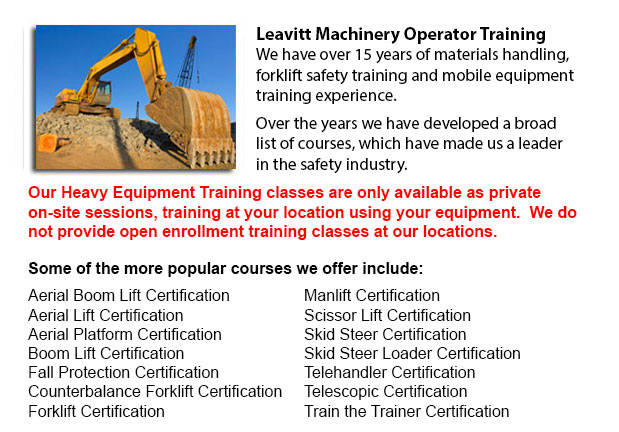
Heavy Equipment Operator Certification Glendale - The individual who manipulates the controls and drives various types of heavy equipment is known as a heavy equipment operator. Most frequently, this machinery is utilized on construction sites to lift and deliver heavy supplies and in order to move earth and perform construction work. Heavy industrial machines could comprise backhoes, cranes, excavators and bulldozers. The operator should adhere to safety procedures as he maneuvers the machine to finish his job. He might be the sole equipment operator on the jobsite or as part of a team.
A heavy equipment operator would make use of different construction machines, depending upon the nature of the job at hand. The big equipment are built to carry out specific tasks in the most effective method for each industry. Different types of equipment are small enough to be used inside of warehouses or within plants, and can be specifically designed to move pallets and boxes. Bigger machinery is customarily used outdoors to grade land and clear areas in preparation for construction.
Many work projects would need a qualified heavy equipment operator, like for example a lot of public works projects and private endeavors. Public works jobs can include the construction of roads or a bridge. There are many other projects which are publicly financed which comprise airport runways, dam construction, power plants, municipal structures and levees. Private projects could comprise the construction of malls, office buildings, industrial parks and retail stores.
Some of the smaller scale jobs need machinery made of the use within big industrial spaces or within commercial buildings. Normally, the machine selection comprises cherry pickers, pallet jacks and forklifts. Trenchers and backhoes are usually available in different sizes appropriate for work requiring powerful and less bulky machines.
Operators of heavy equipment would be required to be certified by their local or regional agency. A lot of these operators are cross-trained and certified to operate a lot of different models of heavy equipment. Other operators choose to specialize in operating just one kind of machinery and just need periodic updates on their operating permit certifications.
The employers working in this industry operating heavy equipment would normally be trained by taking a formal apprenticeship course or by receiving on-the-job training by their companies or unions. It is necessary that employers hire completely-trained heavy equipment operators to adhere to local guidelines and comply with local and regional laws regarding employee safety and job situations.
-
Aerial Lift Train the Trainer Glendale
Aerial Lift Train the Trainer Glendale - The Aerial Lifts Train the Trainer Certification Program will teach trainers how to effectively train operators in safe industrial mobile machine operation. Trainers are given in-depth instruction on aerial li... More -
Forklift License Glendale
Forklift License Glendale - In North America, acquiring a forklift license or forklift certification involves hands-on and classroom training. Regulatory control over certification, training and license for powered industrial truck operators falls un... More -
Telehandler Certification Glendale
Telehandler Certification Glendale - Telehandler certification programs are both for operators who have some experience driving a typical forklift and for individuals with no experience. The real-world training provided by these courses produces grad... More -
Operator Safety Training and Re-Qualification Training and In-House Instructor Training in Glendale
Forklifts are used in almost all warehouse operations and in boat yards and in industrial construction sites. The reach feature of a forklift is a very important component utilized in a variety of applications like for example when a shelving system... More -
Manlift Training Glendale
Manlift Training Glendale - Different manlift training programs include the content and review of manlift devices. An important portion of the program is the practicum where students show their practical ability and knowledge to safely operate a manl... More -
Crane Certification Glendale
Crane Certification Glendale - The Crane Certification Program consists of the industry suggested subject matter which will teach the safe and efficient operation of cranes. The individual would train in the following: how to identify cranes and thei... More -
Loader Ticket Glendale
Loader Ticket Glendale - Gehl articulated loaders have been made to suit practically every condition. They offer optimal maneuverability and great traction due to a heavy-duty oscillating joint that provides 45-degree rotating angles right and left,... More -
Crane Ticket Glendale
Crane Ticket Glendale - The new version of a crane could be either simple or complex, and cranes vary based on their use. Mobile cranes, for instance are rather simple. A telescopic boom or steel truss mounts its movable platform. A system of levers... More

Forklift Training Glendale
TOLL FREE: 1-888-254-6157
Glendale, Arizona
forkliftcertificationglendale.com
Email Us
About Us


